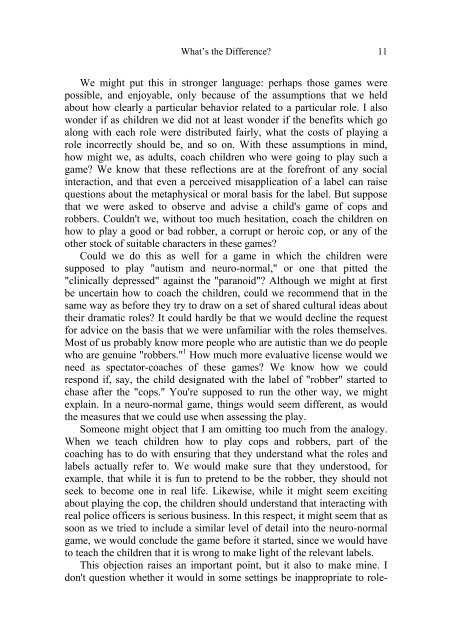978-1-4438-4527-4-sample
978-1-4438-4527-4-sample
978-1-4438-4527-4-sample
You also want an ePaper? Increase the reach of your titles
YUMPU automatically turns print PDFs into web optimized ePapers that Google loves.
What’s the Difference?<br />
We might put this in stronger language: perhaps those games were<br />
possible, and enjoyable, only because of the assumptions that we held<br />
about how clearly a particular behavior related to a particular role. I also<br />
wonder if as children we did not at least wonder if the benefits which go<br />
along with each role were distributed fairly, what the costs of playing a<br />
role incorrectly should be, and so on. With these assumptions in mind,<br />
how might we, as adults, coach children who were going to play such a<br />
game? We know that these reflections are at the forefront of any social<br />
interaction, and that even a perceived misapplication of a label can raise<br />
questions about the metaphysical or moral basis for the label. But suppose<br />
that we were asked to observe and advise a child's game of cops and<br />
robbers. Couldn't we, without too much hesitation, coach the children on<br />
how to play a good or bad robber, a corrupt or heroic cop, or any of the<br />
other stock of suitable characters in these games?<br />
Could we do this as well for a game in which the children were<br />
supposed to play "autism and neuro-normal," or one that pitted the<br />
"clinically depressed" against the "paranoid"? Although we might at first<br />
be uncertain how to coach the children, could we recommend that in the<br />
same way as before they try to draw on a set of shared cultural ideas about<br />
their dramatic roles? It could hardly be that we would decline the request<br />
for advice on the basis that we were unfamiliar with the roles themselves.<br />
Most of us probably know more people who are autistic than we do people<br />
who are genuine "robbers." 1 How much more evaluative license would we<br />
need as spectator-coaches of these games? We know how we could<br />
respond if, say, the child designated with the label of "robber" started to<br />
chase after the "cops." You're supposed to run the other way, we might<br />
explain. In a neuro-normal game, things would seem different, as would<br />
the measures that we could use when assessing the play.<br />
Someone might object that I am omitting too much from the analogy.<br />
When we teach children how to play cops and robbers, part of the<br />
coaching has to do with ensuring that they understand what the roles and<br />
labels actually refer to. We would make sure that they understood, for<br />
example, that while it is fun to pretend to be the robber, they should not<br />
seek to become one in real life. Likewise, while it might seem exciting<br />
about playing the cop, the children should understand that interacting with<br />
real police officers is serious business. In this respect, it might seem that as<br />
soon as we tried to include a similar level of detail into the neuro-normal<br />
game, we would conclude the game before it started, since we would have<br />
to teach the children that it is wrong to make light of the relevant labels.<br />
This objection raises an important point, but it also to make mine. I<br />
don't question whether it would in some settings be inappropriate to role-<br />
11


